赖世雄教你学语法第一章笔记
- 格式:docx
- 大小:46.46 KB
- 文档页数:20
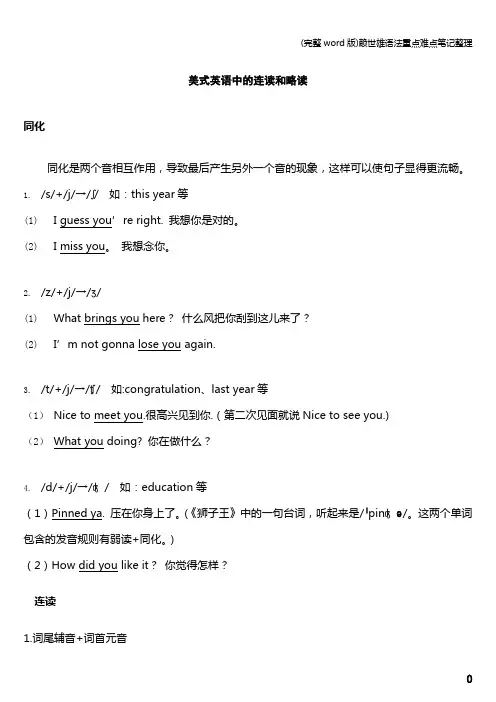
美式英语中的连读和略读同化同化是两个音相互作用,导致最后产生另外一个音的现象,这样可以使句子显得更流畅。
1./s/+/j/→/ʃ/ 如:this year等(1)I guess you’re right. 我想你是对的。
(2)I miss you。
我想念你。
2./z/+/j/→/ʒ/(1)What brings you here?什么风把你刮到这儿来了?(2)I’m not gonna lose you again.3./t/+/j/→/ʧ/ 如:congratulation、last year等(1)Nice to meet you.很高兴见到你.(第二次见面就说Nice to see you.)(2)What you doing? 你在做什么?4./d/+/j/→/ʤ/ 如:education等(1)Pinned ya. 压在你身上了。
(《狮子王》中的一句台词,听起来是/ˈpinʤə/。
这两个单词包含的发音规则有弱读+同化。
)(2)How did you like it?你觉得怎样?连读1.词尾辅音+词首元音这种连读最常见也最简单,把相邻的两个单词想象成一个单词即可。
(1)I’m so fed up with him。
他让我烦透了.(2)I’ve already made up my mind. 我意已决。
(3)That is so gross [ɡrəus].太俗了。
(4)Turn on the juice. 合上开关,恢复通电。
(juice也有电的意思)2.词尾元音+词首元音A:以/u/、/ʊ/、/au/、/o/结尾的单词与跟在后面的元音连读时,两个元音之间加上一个较轻的/w/,这样过渡就会很自然。
(1)Just do it. 尽管去做吧!(2)It’s snowing. 下雪了。
(3)Don't blow it。
别搞砸了。
(4)So easy. 太简单了。
B:如果单词结尾是/i/、/ai/、/e/结尾并与其后的元音连读,则两个元音见带上一个较弱的/j/。

赖世雄初级美语入门赖世雄初级美语入门篇》听课笔记,持续更新中~(原创)这是《赖世雄初级美语入门篇》听课笔记,需要的请下载~~~wql 2004-12-04 16:41我急需cmczbms2004-12-06 12:09Lesson 01greetingsADont forget to say greetings to uncle Wang.见到王伯伯的时候不要忘了向他问好。
I hope you have a good morning.Who are you 你是谁Where are you 你在哪儿,How are you 你好吗,回答用,Im fine.Im a boy. You area boy. He is a boy.This bed is bad. 这个床很坏。
注意 bed 和 bad 的发音区别。
I seeyou there. 我看见你在那里。
See you. Good bye. Bye. See you later.Bhi 和 hey的区别。
Hows it goingGreat. Wonderful. Cool.How are you doing Howre you doing How are you回答用 notbad。
take care保重。
take care of yourself.You tooHave a good time. 过你愉快。
Thanks. You too.谢谢,你也一样。
cmczbms 2004-12-06 12:12Lesson1Greetings打招呼DialogAA: Good morning May. How are youB: Hi Tom.I’m fine. And youA: Not bad. Thanks.B: Good. Se e you.A: Bye.BA: Hi May. How’s it goingB: Great. And how are you doingA: Not bad.B: Ok. See you later.A: Take care.B: You too.A甲:早啊,小梅。
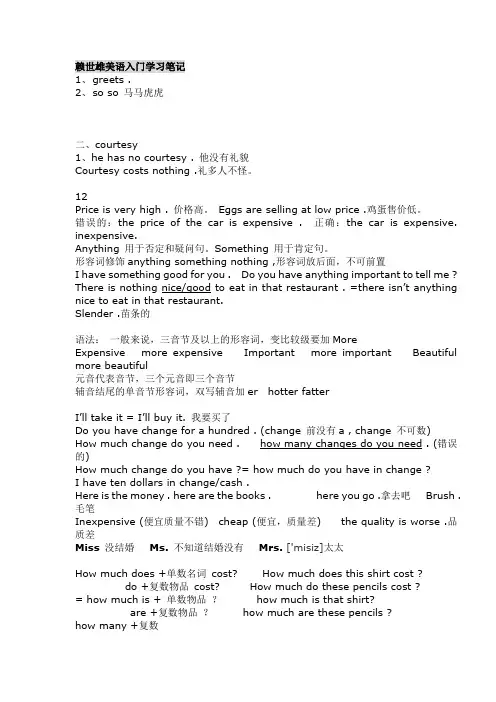
赖世雄美语入门学习笔记1、greets .2、so so 马马虎虎二、courtesy1、he has no courtesy . 他没有礼貌Courtesy costs nothing .礼多人不怪。
12Price is very high . 价格高。
Eggs are selling at low price .鸡蛋售价低。
错误的:the price of the car is expensive . 正确:the car is expensive. inexpensive.Anything 用于否定和疑问句。
Something 用于肯定句。
形容词修饰anything something nothing ,形容词放后面,不可前置I have something good for you . Do you have anything important to tell me ? There is nothing nice/good to eat in that restaurant . =there isn’t anything nice to eat in that restaurant.Slender .苗条的语法:一般来说,三音节及以上的形容词,变比较级要加MoreExpensive more expensive Important more important Beautiful more beautiful元音代表音节,三个元音即三个音节辅音结尾的单音节形容词,双写辅音加er hotter fatterI’ll take it = I’ll buy it. 我要买了Do you have change for a hundred . (change 前没有a , change 不可数) How much change do you need . how many changes do you need . (错误的)How much change do you have ?= how much do you have in change ?I have ten dollars in change/cash .Here is the money . here are the books . here you go .拿去吧Brush .毛笔Inexpensive (便宜质量不错) cheap (便宜,质量差) the quality is worse .品质差Miss没结婚Ms. 不知道结婚没有Mrs.['misiz]太太How much does +单数名词cost? How much does this shirt cost ?do +复数物品cost? How much do these pencils cost ?= how much is + 单数物品?how much is that shirt?are +复数物品?how much are these pencils ?how many +复数13课Hostess 女服务员I’d like to book(reserve) a table for seven. 订桌子(门票通常用reserve)Do you have a table for two ? =do you have a table for two people.有两个人的桌子么May I have the menu .我能看菜单么。
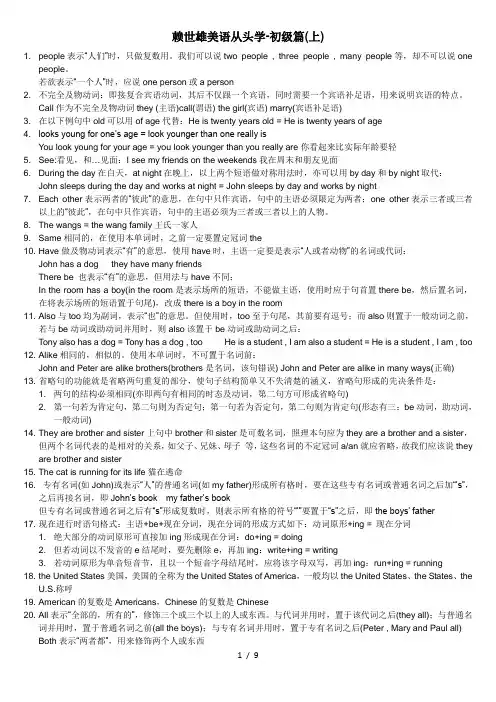
赖世雄美语从头学-初级篇(上)1. people表示“人们”时,只做复数用。
我们可以说two people , three people , many people等,却不可以说onepeople。
若欲表示“一个人”时,应说one person或a person2. 不完全及物动词:即接复合宾语动词,其后不仅跟一个宾语,同时需要一个宾语补足语,用来说明宾语的特点。
Call作为不完全及物动词they (主语)call(谓语) the girl(宾语) marry(宾语补足语)3. 在以下例句中old可以用of age代替:He is twenty years old = He is twenty years of age4. looks young for one’s age = look younger than one really isYou look young for your age = you look younger than you really are你看起来比实际年龄要轻5. See:看见,和…见面:I see my friends on the weekends我在周末和朋友见面6. During the day在白天,at night在晚上,以上两个短语做对称用法时,亦可以用by day和by night取代:John sleeps during the day and works at night = John sleeps by day and works by night7. Each other表示两者的“彼此”的意思,在句中只作宾语,句中的主语必须限定为两者;one other表示三者或三者以上的“彼此”,在句中只作宾语,句中的主语必须为三者或三者以上的人物。
8. The wangs = the wang family王氏一家人9. Same相同的,在使用本单词时,之前一定要置定冠词the10. Have做及物动词表示“有”的意思,使用have时,主语一定要是表示“人或者动物”的名词或代词:John has a dog they have many friendsThere be 也表示“有”的意思,但用法与have不同:In the room has a boy(in the room是表示场所的短语,不能做主语,使用时应于句首置there be,然后置名词,在将表示场所的短语置于句尾),改成there is a boy in the room11. Also与too均为副词,表示“也”的意思。
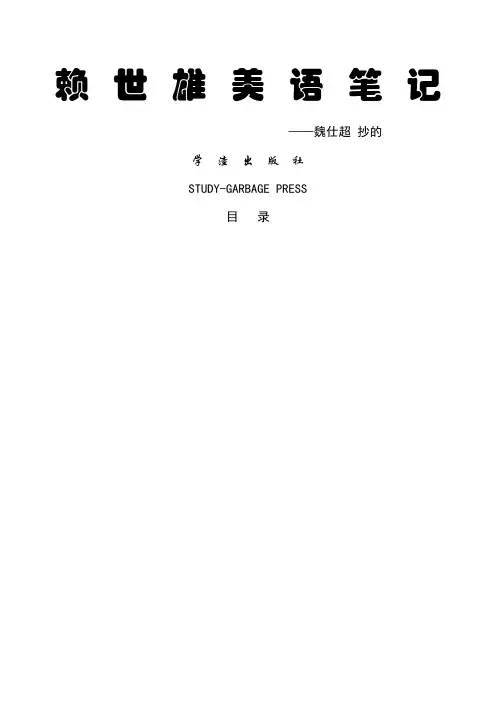
赖世雄美语笔记——魏仕超抄的学渣出版社STUDY-GARBAGE PRESS目录美语入门LESSON 1 greetings词汇:greetings n.问候招呼致意idiom n.短语句子:A:see you later B:alligaterhow are youhow are you doinghow are you getting alonehow have you beenhow's it goingwhat's upwhat's happeningLESSON 2 courtesy词汇:courtesy n.礼貌LESSON 3 what's your name词汇:nationality n.国籍句子:may I have your name please?=what's your name LESSON 4 family name词汇:family name 姓this that these those这个那个这些那些以上为指示代词,也可以有指示形容词的功能,例如this book is goodLESSON 5 how do you do相当于你好,不可以回答I'm fine词汇:occupation n.职业secretary n.秘书pilot n.飞行员句子:how do you do相当于你好,不可以回答I'm fine要说how do you do来回应what do you do你是做什么的LESSON 6 it's five past three词汇:ma'am n.夫人句子:it's five past three=it's three o five三点过五分,十分之后不用加"o"it's twenty to five=it's four fortyLESSON 7月份词汇:January February March April May June July August September October November December句子:June 2 1998这个2不是基数词,是序数词what's today's date今天几月几号LESSON 8 there be句型句子:how's the weather in Beijing=what's the weather like in Beijing 表示“有”句首是人或动物应该使用haveI have a book句首是场所或时间,应该用there is/are在there is/are起首的句型中,应该将there视为固定用语,译成“有”而不要译成“那里是”,若要表示“那里/这里有...”应该说there is.....therethere is a man有个人there has a man 无此用法there is a man there 那里有个人LESSON 9 he's not in句子:he's not in他不在“留话”leave/take messageLESSON 10 can I be of any help for you词汇:clinic n.诊所句子:can I be of any help for you?我能帮您什么?LESSON 11 准备好点单了吗词汇:starve v.饥饿,饿死section n.区域,部门句子:are you ready to ordermay I take your order nowLESSON 13 牛排几分熟词汇:dessert n.甜点steak n.牛排book v.登记well done全熟medium六七分熟medium rare四五分熟rare3分熟LESSON 14 没重点词汇:brand n.品牌on sale 特价pants n.裤子,短裤pair 一条LESSON 15 量尺寸词汇:词汇:gift-wrap包装句子:take one's measurements量一下尺寸give sb. a hand=do sb. a favor帮忙go over there =go thereover用来加强语气表示就在那LESSON 16 one做代词词汇:high heeled n.高跟鞋clerk n.店员句子:one做代词时代替前面出现过的单数名词,ones代替复数名词LESSON 17 查字典词汇:tale n.故事consult v.查询sold out of n.卖完了句子:consult dictionary 查字典look up the word in dictionary 在字典里查词LESSON 18 here we are词汇:domestic n.国内的speed up 加速句子:here we are我们到了here you are/go 在这,拿去there you again 你又来这一套了LESSON 19 how come词汇:twin adj.成双的,双胞胎的rate n.价格费用lobby n.大厅reservation n.预定句子:how come单独用做“怎么回事”句子里how come I didn't know 是说我怎么不知道rate做“价格”时一般用复数what are your rates...LESSON 20 have a reservation强调预定这件事的事实词汇:suite n.套房charge n.记账bellboy n.男服务生句子:have a reservation强调预定事实make a reservation强调预定动作LESSON 21 兑换外币银行说的话词汇:change v.交换n.零钱cash n.现金v.兑换现金currency n.货币change money换钱change A for B把A换成B句子:how do you want your money?兑换外币时银行对顾客说的话,你要兑换多少面值will my passport do? do原意“做”也可以表示“行”“可以”that'll doseven hundreds eight tens and the rest in change此处的rest是代词,代指“其余的”LESSON 22 问生日和介词用法词汇:reconfirm v.再确认confirmation n.确定depart for动身前往某地intend v.打算book in 登记入住句子:date of birth包含年月日,birthday不包含年份表示确切时间介词用at,表示年月季节上午下午晚上时介词用in,表示日期和星期几介词用onLESSON 23 集合名词和arrive in词汇:lounge n.休息室arrival lounge 入境大厅tax n.税aisle n.通道take off 起飞,升空smoking section 吸烟区句子:arrive at后接小地点如邮局车站等arrive in后接大地点如城市国家英文中两个动词在同一个句子时,必须有连词连接,否则为错,但是go和come 以动词原形出现时则可以省略连词and,直接加另一个动词。
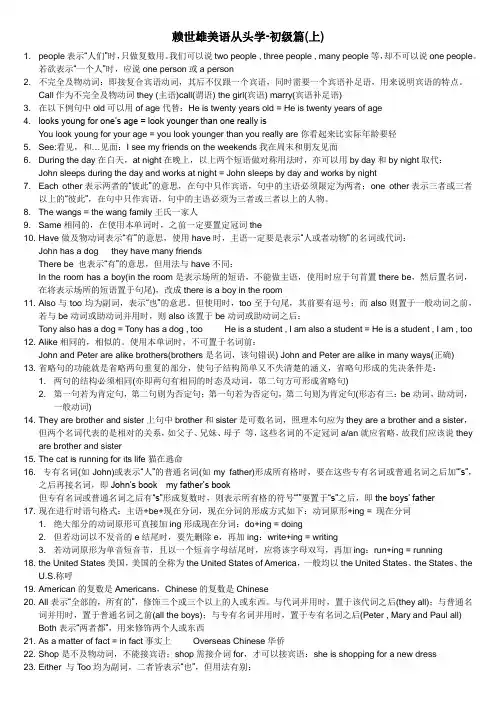
赖世雄美语从头学-初级篇(上)1. people表示“人们”时,只做复数用。
我们可以说two people , three people , many people等,却不可以说one people。
若欲表示“一个人”时,应说one person或a person2. 不完全及物动词:即接复合宾语动词,其后不仅跟一个宾语,同时需要一个宾语补足语,用来说明宾语的特点。
Call作为不完全及物动词they (主语)call(谓语) the girl(宾语) marry(宾语补足语)3. 在以下例句中old可以用of age代替:He is twenty years old = He is twenty years of age4. looks young for one’s age = look younger than one really isYou look young for your age = you look younger than you really are你看起来比实际年龄要轻5. See:看见,和…见面:I see my friends on the weekends我在周末和朋友见面6. During the day在白天,at night在晚上,以上两个短语做对称用法时,亦可以用by day和by night取代:John sleeps during the day and works at night = John sleeps by day and works by night7. Each other表示两者的“彼此”的意思,在句中只作宾语,句中的主语必须限定为两者;one other表示三者或三者以上的“彼此”,在句中只作宾语,句中的主语必须为三者或三者以上的人物。
8. The wangs = the wang family王氏一家人9. Same相同的,在使用本单词时,之前一定要置定冠词the10. Have做及物动词表示“有”的意思,使用have时,主语一定要是表示“人或者动物”的名词或代词:John has a dog they have many friendsThere be 也表示“有”的意思,但用法与have不同:In the room has a boy(in the room是表示场所的短语,不能做主语,使用时应于句首置there be,然后置名词,在将表示场所的短语置于句尾),改成there is a boy in the room11. Also与too均为副词,表示“也”的意思。
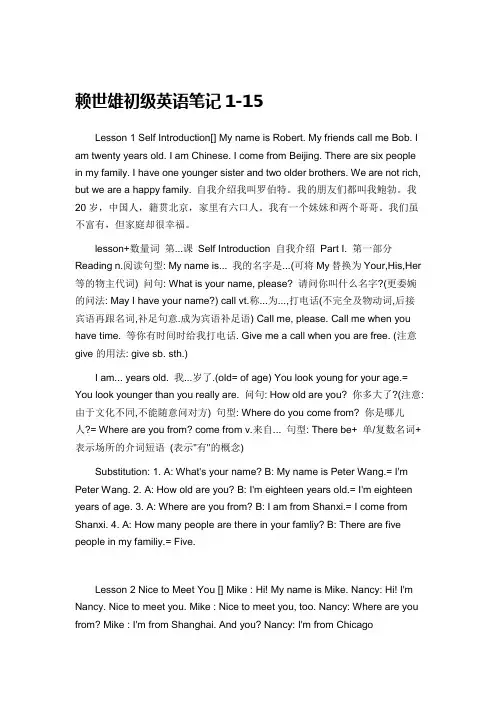
赖世雄初级英语笔记1-15Lesson 1 Self Introduction[] My name is Robert. My friends call me Bob. I am twenty years old. I am Chinese. I come from Beijing. There are six people in my family. I have one younger sister and two older brothers. We are not rich, but we are a happy family. 自我介绍我叫罗伯特。
我的朋友们都叫我鲍勃。
我20岁,中国人,籍贯北京,家里有六口人。
我有一个妹妹和两个哥哥。
我们虽不富有,但家庭却很幸福。
lesson+数量词第...课Self Introduction 自我介绍Part I. 第一部分Reading n.阅读句型: My name is... 我的名字是...(可将My替换为Your,His,Her 等的物主代词) 问句: What is your name, please? 请问你叫什么名字?(更委婉的问法: May I have your name?) call vt.称...为...,打电话(不完全及物动词,后接宾语再跟名词,补足句意.成为宾语补足语) Call me, please. Call me when you have time. 等你有时间时给我打电话. Give me a call when you are free. (注意give的用法: give sb. sth.)I am... years old. 我...岁了.(old= of age) You look young for your age.= You look younger than you really are. 问句: How old are you? 你多大了?(注意:由于文化不同,不能随意问对方) 句型: Where do you come from? 你是哪儿人?= Where are you from? come from v.来自... 句型: There be+ 单/复数名词+ 表示场所的介词短语(表示"有"的概念)Substitution: 1. A: What's your name? B: My name is Peter Wang.= I'm Peter Wang. 2. A: How old are you? B: I'm eighteen years old.= I'm eighteen years of age. 3. A: Where are you from? B: I am from Shanxi.= I come from Shanxi. 4. A: How many people are there in your famliy? B: There are five people in my familiy.= Five.Lesson 2 Nice to Meet You [] Mike : Hi! My name is Mike. Nancy: Hi! I'm Nancy. Nice to meet you. Mike : Nice to meet you, too. Nancy: Where are you from? Mike : I'm from Shanghai. And you? Nancy: I'm from Chicago幸会迈克:嗨!我叫迈克。
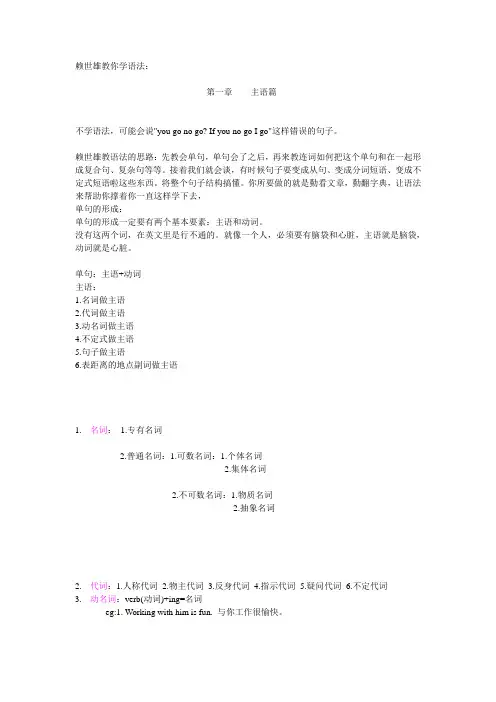
赖世雄教你学语法:第一章主语篇不学语法,可能会说"you go no go? If you no go I go"这样错误的句子。
赖世雄教语法的思路:先教会单句,单句会了之后,再来教连词如何把这个单句和在一起形成复合句、复杂句等等。
接着我们就会谈,有时候句子要变成从句、变成分词短语、变成不定式短语啦这些东西。
将整个句子结构搞懂。
你所要做的就是勤看文章,勤翻字典,让语法来帮助你撑着你一直这样学下去,单句的形成:单句的形成一定要有两个基本要素:主语和动词。
没有这两个词,在英文里是行不通的。
就像一个人,必须要有脑袋和心脏,主语就是脑袋,动词就是心脏。
单句:主语+动词主语:1.名词做主语2.代词做主语3.动名词做主语4.不定式做主语5.句子做主语6.表距离的地点副词做主语1.名词:1.专有名词2.普通名词:1.可数名词:1.个体名词2.集体名词2.不可数名词:1.物质名词2.抽象名词2.代词:1.人称代词2.物主代词3.反身代词4.指示代词5.疑问代词6.不定代词3.动名词:verb(动词)+ing=名词eg:1. Working with him is fun. 与你工作很愉快。
2.Studying English is interesting.学习英语很有趣。
3. writing this letter took me a lot of time.写这封信花了我很多时间。
4.不定式: to(虚词)+原形动词。
eg:To study abroad is my goal.出国深造是我的目标。
注意:动名词和不定式用法上的区别:不定式做主语的时候,它所表示的动作通常还没有做,如果已经做过,有经验了,我们就用动名词短语。
eg:1. Working with him is a lot of fun.跟他共事很愉快。
显然以前共事过。
2.To study abroad is my goal.出国深造是我的目标。
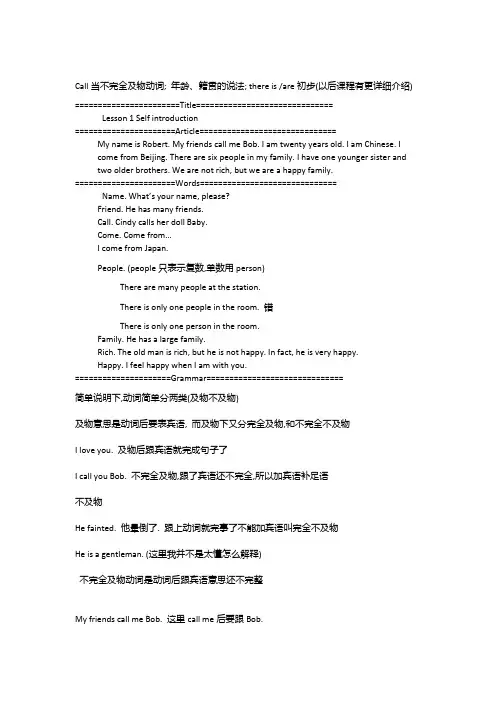
Call当不完全及物动词; 年龄、籍贯的说法; there is /are初步(以后课程有更详细介绍)=======================Title==============================Lesson 1 Self introduction======================Article==============================My name is Robert. My friends call me Bob. I am twenty years old. I am Chinese. Icome from Beijing. There are six people in my family. I have one younger sister and two older brothers. We are not rich, but we are a happy family.======================Words==============================Name. What’s your name, please?Friend. He has many friends.Call. Cindy calls her doll Baby.Come. Come from…I come from Japan.People. (people只表示复数,单数用person)There are many people at the station.There is only one people in the room. 错There is only one person in the room.Family. He has a large family.Rich. The old man is rich, but he is not happy. In fact, he is very happy.Happy. I feel happy when I am with you.=====================Grammar==============================简单说明下,动词简单分两类(及物不及物)及物意思是动词后要表宾语, 而及物下又分完全及物,和不完全不及物I love you. 及物后跟宾语就完成句子了I call you Bob. 不完全及物,跟了宾语还不完全,所以加宾语补足语不及物He fainted. 他晕倒了. 跟上动词就完事了不能加宾语叫完全不及物He is a gentleman. (这里我并不是太懂怎么解释)不完全及物动词是动词后跟宾语意思还不完整My friends call me Bob. 这里call me后要跟Bob.They call the little girl…这里并没有结束后面必须加宾语补足语They call the little girl Mary.I am twenty years old.句子结构为人+be动词+数字+year(s) +old/of age.I am twenty years old.The baby is one year old.He is forty years of age.Age.看起来比实际年轻的用法Look young of one’s age. == Look younger than one really is.You look young of your age. You look younger than you are.He look young of his age. He younger than he really is.I am Chinese. = I am a Chinese.当形容词用不用加a,当名词用要加aThere are six people in my family.这里there are表示有(后面是复数) there同时也是副词”那里”的意思,但后面跟be动词is/are时表示有,以后会说到have这个有的区别Put the book there. 把书放在那里=======================讲解==============================Lesson one self introductionThe lesson is very good. 这一课相当不错Lesson one/two 第一/二课Part one第一部分reading 阅读My name is Robert.My 我的my bicycle我的自行车my home我家Name 名字What's your name, please? 请问你叫什么名字.=what is your name, please?My name is Peter. My name is Robert.please,请,但英美一般放句尾,please前通常放逗号Open the door, please.My friends call me Bob.Friend +s是朋友的复数,2个及以上call除了称某人为...还有打电话的意思Call me, please. 请打电话给我Call me when you have time. 有空给我电话Give me a call when you have time.在这句,call为名词(如果暂时不理解不是很重要)I am twenty years old.I am * year(s) old 我是多少岁,当一岁就用year没有复数,但你一岁也说不出这句. He is one year old.I am twenty years. (那就是我20年,没人理解是什么意思)old不能省,但也可以改用of age.I am twenty years of age.也可以直接I am twenty.How old are you? 你多大年龄,按中文说法就是: you are how old. 英语中疑问词需要放在句首(以后会具体讲)在英美环境,一般男的不能随便问女人年龄I am Chinese.I am a Chinese.这样也行,但不加也可以,一个是名词,一个是形容词(如果暂时不理解没关系) 单数名词要加冠词This is a book. He is a Chinese. Chinese同时也可作形容词. I amChinese.He is an American. 名词He is American.形容词I come from Beijing.come来, from从什么地方I come from Guangdong. He comes from Sichuan.I am from Beijing.也可以Where are you from? 你是哪里人,中文直接翻译是you are from where?但英文疑问词放句首(第二次讲了)Where do you come from? 你是哪里人,这里面有个do先讲一下,以后还会具体讲. come是一般动词,一般动词没办法与主语倒装,be动词才可以your name is what?-- What is your name? come不能直接写成: where come you from? 所以就加助动词do, where do you come from? 如果是be动词的, where are you from?这样可以There are six people in my family.在英文中have ,has是有的意思,但只有那些有生命的东西才能用这个有. In my family has six people.这样是错的,因为家庭不是指某个具体有生命的动物不能用have ,has,另外,in my family,这个由in引导的介词短语不能作主语(暂时记也可以),如果遇到这种介词短语的,那就用there is/are作主语,there are后面跟复数名词桌上有本书,中文本能on the desk has a book.由上可知这是错的,只能改用there is, there are.但这里是单数一本书,就用there is a book one thedesk.房间里有一只猫. There is a cat in the room.There are six people in my family.同理一个人用person.两个人或以上就用peopleOne person,一个人,两个人就用two peopleI have one younger sister and two older brothers.这里有have了,一般用have主语就是有生命的动物I have a book. He has a book. (第三人单数称用has)Younger sister表示妹妹,如果不加就是表示姐妹,可能是姐姐也可能是妹妹,older大的就是哥哥Younger sister, younger brother妹妹,弟弟Older brother哥哥,older sister姐姐We are not rich, but we are a happy family.but是连词,但是的意思rich富有的He is rich.他很有钱He is rich, but he is not happy.他有钱但不快乐.(骗人的,有钱的人都很快乐)======================Practice==============================What's your name?My name is Peter Wang. == I'm peter Wang.How old are you?I'm eighteen years old. == I'm eighteen years of age.Where are you from?I am from Shanxi. == I come from Shanxi.How many people are there in your family? There are five people in my family. == Five.。
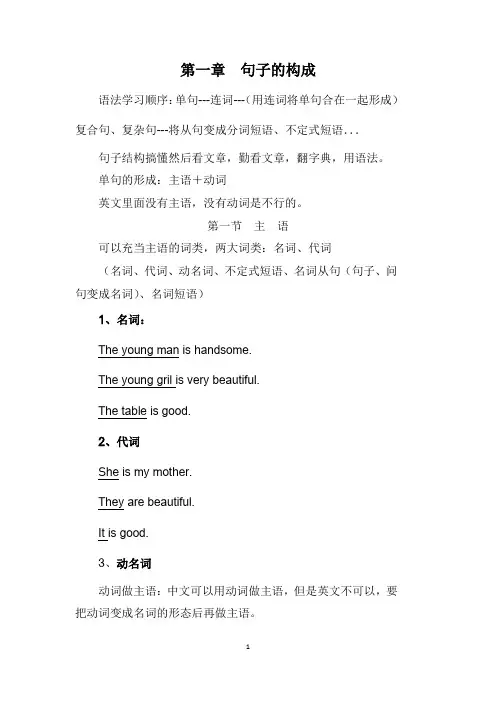
第一章句子的构成语法学习顺序:单句---连词---(用连词将单句合在一起形成)复合句、复杂句---将从句变成分词短语、不定式短语...句子结构搞懂然后看文章,勤看文章,翻字典,用语法。
单句的形成:主语+动词英文里面没有主语,没有动词是不行的。
第一节主语可以充当主语的词类,两大词类:名词、代词(名词、代词、动名词、不定式短语、名词从句(句子、问句变成名词)、名词短语)1、名词:The young man is handsome.The young gril is very beautiful.The table is good.2、代词She is my mother.They are beautiful.It is good.3、动名词动词做主语:中文可以用动词做主语,但是英文不可以,要把动词变成名词的形态后再做主语。
把动词变成的名词叫做动名词。
动名词:动词+ing定义:英语中的动名词是由动词变化而来,它仍一方面保留着动词的某些特征,具有动词的某些变化形式,用以表达名词所不能表达的较为复杂的意念,另一方面动名词在句子的用法及功能与名词类同:在句子可以做主语、宾语、表语、定语。
它也可以被副词修饰或者用来支配宾语。
动名词(做主语):所表示的动作已经做过、有经验、已经事实。
Studying English it is Interesting.Working with him is fine.4、不定式短语to+动词原形to+V原形to---虚词短语---就是两个以上的单词构成的字群。
动名词短语:to go不定式短语:working whit him不定式短语做主语:所表示的动作通常还未做。
未做的事情、目的、梦想、计划、理想用不定式to(做主语)。
To buy something is one of plans.To see him is my purpose.To study abroad is my dream.动名词短语做主语:所表示的动作已经做过、有经验、已经事实。
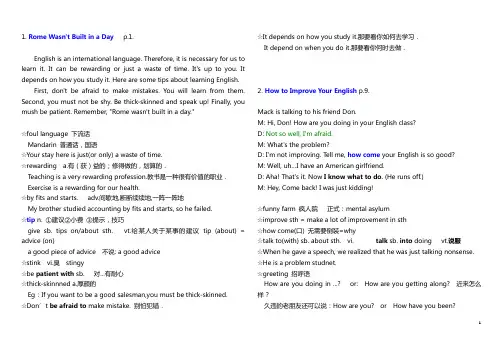
1. Rome Wasn't Built in a Day p.1.English is an international language. Therefore, it is necessary for us to learn it. It can be rewarding or just a waste of time. It's up to you. It depends on how you study it. Here are some tips about learning English.First, don't be afraid to make mistakes. You will learn from them. Second, you must not be shy. Be thick-skinned and speak up! Finally, you mush be patient. Remember, "Rome wasn't built in a day."☆foul language 下流话Mandarin 普通话,国语☆Your stay here is just(or only) a waste of time.☆rewarding a.有(获)益的;修得做的,划算的.Teaching is a very rewarding profession.教书是一种很有价值的职业.Exercise is a rewarding for our health.☆by fits and starts. adv.间歇地,断断续续地,一阵一阵地My brother studied accounting by fits and starts, so he failed.☆tip n. ①建议②小费③提示,技巧give sb. tips on/about sth. vt.给某人关于某事的建议tip (about) = advice (on)a good piece of advice 不说: a good advice☆stink vi.臭stingy☆be patient with sb. 对...有耐心☆thick-skinnned a.厚颜的Eg:If you want to be a good salesman,you must be thick-skinned.☆Don’t be afraid to make mistake. 别怕犯错.☆It depends on how you study it.那要看你如何去学习.It depend on when you do it.那要看你何时去做.2. How to Improve Your English p.9.Mack is talking to his friend Don.M: Hi, Don! How are you doing in your English class?D: Not so well, I'm afraid.M: What's the problem?D: I'm not improving. T ell me, how come your English is so good?M: Well, uh…I have an American girlfriend.D: Aha! That's it. Now I know what to do. (He runs off.)M: Hey, Come back! I was just kidding!☆funny farm 疯人院正式:mental asylum☆improve sth = make a lot of improvement in sth☆how come(口) 无需要倒装=why☆talk to(with) sb. about sth. vi. talk sb. into doing vt.说服☆When he gave a speech, we realized that he was just talking nonsense. ☆He is a problem studnet.☆greeting 招呼语How are you doing in ...? or: How are you getting along? 近来怎么样?久违的老朋友还可以说:How are you? or How have you been?Howdy 美国南部招呼语answer: Howdy☆blind date 相亲,盲目约会☆I am afraid (that省略) it is going to rain, so we can't go on a picnic. 我认为...(弱语气)☆What's the problem (with)?= What's wrong?= What's the matter (with)?☆goof around 浪费时间,混时间☆Aha, that's it. = Aha, I get it. = I understand.☆kidding = joking3. The City of Song p.13Listening to music is the favorite pastime of many people all over the world. This is especially true for people living in Vienna, the city of song. Being the home of Mozart, this city is the birthplace of classical music and the waltz.Music fills the air in Vienna. Going to public concerts is often free of charge. And don't forget, Vienna is also home to the world famous Vienna Boys' Choir. No wonder people say Austria is always alive with the sound of music.☆Austria Australia jog 慢跑chore 杂物(可数) potbelly 大肚皮He is a potbelly. ☆the world over adv. = around the world = throughout the world = all over the world☆maestro 艺术大师,名作曲家☆birthplace 发源地,诞生日classical 古典的classic 经典的☆be free (of charge) 免费的This sample is free of charge.☆be enslaved by 被...奴役be enslaved to a bad habit 改不掉坏习惯☆be home to 某地是…的所在地/出产地/聚集地be the home of 某地是…的故乡/老家☆no wonder + clause(主+v.)adv.难怪Eg:No wonder Bruce is in such a good shape, he excercises.No wonder you’re so thin, you eat so little.☆be alive with a.活的,充满的Eg:The room is alive with children’s laughter.sth. fill the air充满着某物Eg:Romatic love songs fill the air in that cozy Italian restaurant.那家温馨的意大利餐馆充满着罗曼蒂克的情歌.4. He Who Hesitates Is Lost p.21Mike is in Vienna with his girlfriend Daisy.M: Are you having a good time, Daisy?D: Are kidding? I'm having the time of my life. I loved the concerts.M: Concert going is fantastic but what else can we do?D: Biking along the banks of the river Danube could be fun.M: It sounds like a great idea!D: Let's do it then.M: You're right. As they say, "He who hesitates is lost."☆He who(引导表语从句) hesitates is lost. 迟疑着将丧失良机.hesitates to …做…犹豫不决He who…+单数动词“凡是…的人….”= one who.. = those who +复数动词Eg:He who works hard will be successful. "He" means anyone. or: one, those☆I was lost in that music. "沉醉于"= be absorbed in one's work☆While on vacation last year, I visited France and Italy. 渡假☆Chinese character “中国字”不说Chinese words☆The artist will put on (hold) an exhibit next month. (put on 娱乐)☆fantastic = wonderful, great, awesome, terrific (cool for the young) aweful = terrible 糟☆Biking along the bank could be/can be/must be/is fun.☆have 做“有”无进行时态Eg:I have a car. I have time.即,无法说"正在"的词,无进行时态I love you.5. Bungee Jumping p.26Bungee jumping looks like It makes me nervous to watch someone do it. It certainly takes a lot of guts to jump one thousand feet above the water with only a rope tied to your legs. It scares me just to think about it. However, it is something I really want to do one day.Some people think I'm crazy. They say to jump is foolish enough, but to have to pay for it is madness. I don't agree. For me, to live a short and exciting life is far better than to live a long and boring one. What do you think?☆wild boar 野猪☆Paper originated in China. 起源于☆have the guts(口语)/courage to be. 有做…的勇气/胆量.pluck up one's courage 鼓起勇气muster up one's courageEg:Bill does not have the guts to ask Marry to go out for a date.☆be tied to = be bound (bind) to 被...绑在That poor dog is tied/bound to the fence, he can not run away.☆be scared of = be frightened of Peter is scared of snakes.scare sb. to death 把某人吓的要死.He scared me to death.☆He looked into the mirror and found he looked much older. 照镜子☆cockroach(es) 蟑螂lunatic n.adj疯子luna 月亮(拉丁文)☆get some where有出息get no where 没出息If you work hard you get somewhere someday.☆I agree with you on this point, but I disable agree with you on that point. ☆agreeable 相处容易的: I like Marry, because she's a very agreeable personality.☆live/lead + a/an +a. life过着…生活The famous sight lives/leads a simple life.☆boring a.令人厌烦的,无聊的(指事)So boring 真无聊boring daybe bored with a.感到厌烦的(指人)=be fed up with =be sick of =be tired of “受够了”“对…感厌烦”☆What do you think? 你认为呢?☆looks /tastes /sounds like(prep.) 后接名词“象”☆知觉动词vt. 看:see, watch,look at(注视) 听:hear,listion to 感觉:feel1)vt.+宾+宾补(动原) 强调确有事情发生,表进行时态2)vt.+宾+宾补(现在分词) 强调事情正在发生3)vt.+宾+宾补(过去分词) 强调被动的状态6. Nothing Ventured, Nothing Gained p.35Lisa and Bill are talking about their future.L: What's your goal in life, Bill?B: To fly in the sky and feel as free as a bird.L: That's easy.B: What do you mean?L: Go bungee jumping.B: You mush be kidding. It's too dangerous.L: Well, nothing ventured, nothing gained.☆If nothing is ventured, nothing will be gained.☆Everybody shoule have a goal in life.My goal is to learn English better one day.☆Growing up is learning experience. ☆pearl 珍珠Pearl 女人名☆carve out雕刻出,开创出Eg:By going to school and studying hard, Sam carved out a good career of his future.☆attain/reach/fulfill one's goal☆Peter and Bruce are as busy as bees.Ever since sam lived on his own, he has felt as free as a bird.山姆自从独立生活以来觉得自由极了.To fly in the sky and feel as free as a bird.象鸟儿一样在天气自由翱翔。
1. Rome Wasn't Built in a Day p.1.English is an international language. Therefore, it is necessary for us to learn it. It can be rewarding or just a waste of time. It's up to you. It depends on how you study it. Here are some tips about learning English.First, don't be afraid to make mistakes. You will learn from them. Second, you must not be shy. Be thick-skinned and speak up! Finally, you mush be patient. Remember, "Rome wasn't built in a day."☆foul language 下流话Mandarin 普通话,国语☆Your stay here is just(or only) a waste of time.☆rewarding a.有(获)益的;修得做的,划算的.Teaching is a very rewarding profession.教书是一种很有价值的职业.Exercise is a rewarding for our health.☆by fits and starts.adv.间歇地,断断续续地,一阵一阵地My brother studied accounting by fits and starts, so he failed.☆tip n.①建议②小费③提示,技巧give sb. tips on/about sth. vt.给某人关于某事的建议tip (about) = advice (on)a good piece of advice 不说: a good advice☆stink vi.臭stingy☆be patient with sb. 对...有耐心☆thick-skinnned a.厚颜的Eg:If you want to be a good salesman,you must be thick-skinned.☆Don’t be afraid to make mistake. 别怕犯错.☆It depends on how you study it.那要看你如何去学习.It depend on when you do it.那要看你何时去做.2. How to Improve Y our English p.9.Mack is talking to his friend Don.M: Hi, Don! How are you doing in your English class?D: Not so well, I'm afraid.M: What's the problem?D: I'm not improving. Tell me, how come your English is so good?M: Well, uh…I have an American girlfriend.D: Aha! That's it. Now I know what to do. (He runs off.)M: Hey, Come back! I was just kidding!☆funny farm 疯人院正式:mental asylum☆improve sth = make a lot of improvement in sth☆how come(口) 无需要倒装=why☆talk to(with) sb. about sth. vi. talk sb. into doing vt.说服☆When he gave a speech, we realized that he was just talking nonsense.☆He is a problem studnet.☆greeting 招呼语How are you doing in ...? or: How are you getting along? 近来怎么样?久违的老朋友还可以说:How are you? or How have you been?Howdy 美国南部招呼语answer: Howdy☆blind date 相亲,盲目约会☆I am afraid (that省略) it is going to rain, so we can't go on a picnic. 我认为...(弱语气)☆What's the problem (with)?= What's wrong?= What's the matter (with)?☆goof around 浪费时间,混时间☆Aha, that's it. = Aha, I get it. = I understand.☆kidding = joking3. The City of Song p.13Listening to music is the favorite pastime of many people all over the world. This is especially true for people living in Vienna, the city of song. Being the home of Mozart, this city is the birthplace of classical music and the waltz.Music fills the air in Vienna. Going to public concerts is often free of charge. And don't forget, Vienna is also home to the world famous Vienna Boys' Choir. No wonder people say Austria is always alive with the sound of music.☆Austria Australia jog 慢跑chore 杂物(可数) potbelly 大肚皮He is a potbelly.☆the world over adv. = around the world = throughout the world = all over the world☆maestro 艺术大师,名作曲家☆birthplace 发源地,诞生日classical 古典的classic 经典的☆be free (of charge) 免费的This sample is free of charge.☆be enslaved by 被...奴役be enslaved to a bad habit 改不掉坏习惯☆be home to 某地是…的所在地/出产地/聚集地be the home of 某地是…的故乡/老家☆no wonder + clause(主+v.)adv.难怪Eg:No wonder Bruce is in such a good shape, he excercises.No wonder you’re so thin, you eat so little.☆be alive with a.活的,充满的Eg:The room is alive with children’s laughter.sth. fill the air充满着某物Eg:Romatic love songs fill the air in that cozy Italian restaurant.那家温馨的意大利餐馆充满着罗曼蒂克的情歌.4. He Who Hesitates Is Lost p.21Mike is in Vienna with his girlfriend Daisy.M: Are you having a good time, Daisy?D: Are kidding? I'm having the time of my life. I loved the concerts.M: Concert going is fantastic but what else can we do?D: Biking along the banks of the river Danube could be fun.M: It sounds like a great idea!D: Let's do it then.M: You're right. As they say, "He who hesitates is lost."☆He who(引导表语从句) hesitates is lost. 迟疑着将丧失良机.hesitates to …做…犹豫不决He who…+单数动词“凡是…的人….”= one who.. = those who +复数动词Eg:He who works hard will be successful. "He" means anyone. or: one, those☆I was lost in that music. "沉醉于"= be absorbed in one's work☆While on vacation last year, I visited France and Italy. 渡假☆Chinese character “中国字”不说Chinese words☆The artist will put on (hold) an exhibit next month. (put on 娱乐)☆fantastic = wonderful, great, awesome, terrific (cool for the young) aweful = terrible 糟☆Biking along the bank could be/can be/must be/is fun.☆have 做“有”无进行时态Eg:I have a car. I have time.即,无法说"正在"的词,无进行时态I love you.5. Bungee Jumping p.26Bungee jumping looks like fun. It makes me nervous just to watch someone do it. It certainly takes a lot of guts to jump one thousand feet above the water with only a rope tied to your legs. It scares me just to think about it. However, it is something I really want to do one day.Some people think I'm crazy. They say to jump is foolish enough, but to have to pay for it is madness. I don't agree. For me, to live a short and exciting life is far better than to live a long and boring one. What do you think?☆wild boar 野猪☆Paper originated in China. 起源于☆have the guts(口语)/courage to be. 有做…的勇气/胆量.pluck up one's courage 鼓起勇气muster up one's courageEg:Bill does not have the guts to ask Marry to go out for a date.☆be tied to = be bound (bind) to 被...绑在That poor dog is tied/bound to the fence, he can not run away.☆be scared of = be frightened of Peter is scared of snakes.scare sb. to death 把某人吓的要死.He scared me to death.☆He looked into the mirror and found he looked much older. 照镜子☆cockroach(es) 蟑螂lunatic n.adj疯子luna 月亮(拉丁文)☆get some where有出息get no where 没出息If you work hard you get somewhere someday.☆I agree with you on this point, but I disable agree with you on that point.☆agreeable 相处容易的: I like Marry, because she's a very agreeable personality.☆live/lead + a/an +a. life过着…生活The famous sight lives/leads a simple life.☆boring a.令人厌烦的,无聊的(指事)So boring 真无聊 boring day be bored with a.感到厌烦的(指人)=be fed up with =be sick of =be tired of “受够了”“对…感厌烦”☆What do you think?你认为呢?☆looks /tastes /sounds like(prep.) 后接名词“象”☆知觉动词vt.看:see, watch,look at(注视) 听:hear,listion to 感觉:feel1)vt.+宾+宾补(动原) 强调确有事情发生,表进行时态2)vt.+宾+宾补(现在分词)强调事情正在发生3)vt.+宾+宾补(过去分词) 强调被动的状态6. Nothing Ventured, Nothing Gained p.35Lisa and Bill are talking about their future.L: What's your goal in life, Bill?B: To fly in the sky and feel as free as a bird.L: That's easy.B: What do you mean?L: Go bungee jumping.B: You mush be kidding. It's too dangerous.L: Well, nothing ventured, nothing gained.☆If nothing is ventured, nothing will be gained.☆Everybody shoule have a goal in life.My goal is to learn English better one day.☆Growing up is learning experience.☆pearl 珍珠Pearl 女人名☆carve out雕刻出,开创出Eg:By going to school and studying hard, Sam carved out a good career of his future. ☆attain/reach/fulfill one's goal☆Peter and Bruce are as busy as bees.Ever since sam lived on his own, he has felt as free as a bird.山姆自从独立生活以来觉得自由极了.To fly in the sky and feel as free as a bird.象鸟儿一样在天气自由翱翔。
1. Rome Wasn't Built in a Day p.1.English is an international language. Therefore, it is necessary(/ important) for us to learn it. It(/learning English) can be rewarding or just(/only) a waste of time. It's up to you. It depends on how you study it. Here are some tips about(/on) learning English.First, don't be afraid to make(/of making) mistakes. You will learn (something)from them(the mistakes that you make). Second, you must not be shy. Be thick-skinned and speak up! Finally, you must be patient. Remember, "Rome wasn't built in a day."Well, Rome does not refer to the city of Rome only, it refers to the Roman empire, that is the great country that Rome built more than 2000 years ago. It was a great empire and of course you can not build anything good or great in just a short time .the Roman Empire [ˈɛmˌpaɪr] 罗马帝国Empire--this word is spelled e-m-p-i-r-e. Now, I have this question: in what situation will you use this expression "Rome wasn't built in a day "? Please give us an example.Well, let's say that your friend wants to learn how to do something, like typing or swimming, and at first, your friend feels a little discouraged, because it is not easy to learn a new skill, but you tell him: Hey, come on. Rome wasn't built in a day. We want to encourage our friends with this saying.Your friend is learning how to type. He is a little bit discouraged.We can encourage our friends with this saying. 谚语We say that English is an international language, because English is spoken around the world. Of course, there are more speakers of Mandarin than of English, but English is spoken by more people in more countries than Mandarin is, so, when you travel or do business or study overseas, you can always find English speakers, and English TV programs and English newspapers.In other words, English is a universal/ an international language, that is why we should learn it. Mandarin 普通话,国语Bruce speaks beautiful Mandarin.[ˈmændərɪn]foul language 下流话Your stay here is just(or only) a waste of time.rewarding a.有(获)益的;值得做的,划算的.Teaching is a very rewarding profession.教书是一种很有价值的职业.Exercise is very rewarding for our health. It pays(/is rewarding) to exerciseIt is up to you. 随你吧Well, if Peter asks me: do you want to go to a restaurant first or see a movie first tonight? I might say: it's up to you.Do we go to the movies first or shall we go to a restaurant first? It's up to you .but I know the true answer. He enjoys eating more than anything, let's go to the restaurant first .In our studio[ˈstudioʊ], we have got a small studio over here and we have only two people here, that's Bruce and me, but Bruce is much too big, we have little room left here.by fits and starts adv.间歇地,断断续续地,一阵一阵地If you learn English by fits and starts, you’ll get no where.My brother studied accounting by fits and starts, so he failed.If you give me a tip, I’ll give some tips on how to learn English.if you are in a restaurant, and you leave a little money for the waiter, we say that is a tip小费. But then Peter said I'll give you some tips about learning English. -- some advice about learning English.建议advice un.tip①n.小费②n.建议,提示,技巧give sb. tips on/about sth= give sb. advice (on) sth. n.给某人关于某事的建议③vt.给小费Mr. Bruce, before leaving, don't forget to tip me.④vt.建议tip somebody on something (He tipped me on how to learing English)afraid两种用法:afraid to make(/of making) 即+不定式或+ of +动名词I’m afraid to talk to him. I’m afraid of talking to him.advice un. a good piece of advice 不说: a good adviceWell, you have to speak or write a language to really learn it. if you make a mistake while speaking, usually the listener will understand you anyway, because usually your mistake is just a grammar mistake or maybe a vocabulary mistake, but usually we understand you. But if we don't understand you, we will ask: what do you mean? And then you can try again.Only by making mistakes can we learn sth.Children are often shy around strangers.Well, this is often the case, but there is some situation in which adults are shy. For example, each time Bruce is with me he is shy.-- That's not shy, Peter, that's embarrassed. embarrassed stink vi.臭Peter, you stinks.be patient with sb.对...有耐心A good teacher must be patient with his studentsthick-skinnned a.厚颜的Eg:If you want to be a good salesman, you must be thick-skinned.Don’t be afraid to make mistake. 别怕犯错.It depends on how you study it.那要看你如何去学习.It depend on when you do it.那要看你何时去做.2. How to Improve Your English p.9.Mack is talking to his friend Don.M: Hi, Don! How are you doing in your English class?D: Not so well, I'm afraid. (原:I'm afraid I ’m not doing so well in my English class)M: What's the problem (省do you have with your English)?D: I'm not improving(/I’ve not been improving/ I’ve not made any improvement). Tell me, how come your English is so good?M: Well, uh…I have an American girlfriend.D: Aha! That's it. Now I know what to do. (He runs off.)(=runs away)M: Hey, Come back! I was just kidding!Well, probably they would like to hear you speak English only, so please introduce yourself in English again.However, this is basically an English teaching program. So, every now and then, of course, he ?? and speak Chinese. But most of time, he will explain the key points, if there is any inEnglish. so, lesson 2, we had a very short dialogue. now, by the way, what is the meaning of this word "dialogue "?dialogue/dialog A dialog is a conversation between two people. And that is spelled? Well,you can see it on page 9 here "dialogue", but it is also spelled "dialog". so, there are two spellings for this word. Their pronunciation is exactly the same.…O r sometimes just one person, Peter. because sometimes I hear you talking to yourself. Peter is going to be send to a kind of hospital--funny farm.funny farm疯人院正式:mental asylumHe was raised on the farm.Yesterday Peter was send to a nearby mental asylum, because he kept talking to himself. improve vt.vi. improvement n.-->improve sth = make improvement in sthHe improve d his English by studying every day.=He study everyday, so his English improved. Peter, you’ve made a lot of improvement in your Mandarin. improvement un-- Thank you Bruce for teaching me.because he studies hard, he has made a lot of improvement in his English.①talk to(/with) sb. about sth. vi. ②talk sb. into doing vt.+into说服talk nonsense胡说八道What are you talking about? The teachers were talking about the problem student.He is a problem student. --He keeps causing trouble.His girlfriend talk ed Mike into quitting smoking.When he gave the speech, we realized that he was just talking nonsense.He is a problem student.Hi和Hey区别:"Hi" as you just said, is a greeting. if I see my good friends or sometimes my students, I will say "hi", it's a friendly greeting. but "hey" means I want you to pay attention to me. I have something important to talk to you about or maybe to show you. Hey, come here!Hey, listen to me!--but "hey" in this case is not quite impolite, we should only use it between friends.回答Ok, and you?或者fine, thank you等how are you doing? How are you getting along?久违的老朋友还可以说:How are you? or How have you been?Howdy 美国南部招呼语answer: Howdy(=how do you do第一次见面)If you go to Texas or other southern states in the United States, many people will greet you with Howdy.afraid vt.恐怕+that从句(I think/guess)I am afraid (that省略) it is going to rain, so we can't go on the picnic. 我认为...(弱语气,后带内容比较负面)I’m afraid she is not good-looking. I’m going to have a blind date. blind date 相亲,盲目约会Look into the mirror yourself.What's the problem (with)? It seems that he has some problems with the work.= What's wrong?= What's the matter (with)?I'm not improving. 文中= I have not been improving =I have not made any improvement. how come(口) 无需要倒装=whyBruce, How come you look s o ugly/why do you..? Where’s the hankerchief? The truth hurts. why is he late for class again? how come he is late for class again?How come you failed your Chinese text? Why did you fail your Chinese text?Because I goofed around. I didn't study at all. goof around 浪费时间,混时间Aha, that's it. = Aha, I’v got it. = I understand.Aha, means I understand. I’ve got it. For example, if you are trying to think of the answer to a problem, Let's see, the capital of Canada is. .., aha, is Ottawa.If you try to think of a answer t o a problem, Let’s see: the capital of Canady is? Aha, is Ottawa. run off = run away kidding = joking3. The City of Song p.13Listening to music is the favorite pastime of many people all over the world. This is especially true for people living in Vienna, the city of song(un,=music). Being(可省) the home of Mozart, this city is the birthplace of classical music and the waltz.Music fills the air in Vienna. Going to public concerts is often free of charge. And don't forget, Vienna is also home to the world famous Vienna Boys' Choir. No wonder people say Austria is always alive with the sound of music.Oh, Bruce, you know something? I should leave this lesson to you. Because this lesson features one country and that’s? Austria. This country has a lot to do with your background. So, tell all of listeners, how come you have a very close connection with this country? --My mother was born in Yugoslavia, but her mother comes from Austria, and I still have many relatives living there, and I like to visit them every two or three years.I still have many relatives living there, and I like to visit them every two or there years. Austria Australia The city of song refers to the city of Vienna. --You've been to that city before. Tell us something about this city.Vienna is one of the most beautiful citys I have ever seen. I’m not kidding. It's a very old and beautiful city, full of culture, music and good beer.potbelly 大肚皮Well, if you go out with Peter, because he is a big potbelly, you might feel embarrassed..Jogging (/Going jog/Lifting heavy glasses of beer) is my favorite exercise. jog 慢跑What’s your pastime over the weekend? what's your favorite habit?How do you pass the time on your weekends(每逢周末)?Going to a restaurant and seeing a movie.the world over adv. = around/across the world = throughout the world = all over the world Mikle Jackson is famous the world over.song un=music CN歌曲a song You got to face the music.But here I’m a little bit curious again. Now that you just mention you have something to do with Vienna, how come you don't know anything about music?--That's a good question. Peter means I can't sing. I like to listen to music, but I can't sing.To face the music means that you must face your problem, you must try to solve your problem. He was sick of learning, he ran away from home (being) sick of learning, he …Mozart was one of the most famous classical musicians. maestro [ˈmaɪstroʊ] 艺术大师,名作曲家birthplace 发源地,诞生地what’s your birthplace?=where were you born?In fact, I was born in Nanjing, even though my hometown is in Guangxi province.Sure, this is true. When you go to Vienna, especially in the summer time, you can hear music being played, not from the radio or the CD player, but from the people who play music on the street or in the parks or in the concerts. You can hear music as you walk around the city.In other words, you can see a live shows/concerts on your own. live adj.现场的classical 古典的classic 经典的be free (of charge) 免费的--I work for Peter free of charger. In other words, I am enslaved by Peter.--In fact, the truth is I am a slave to Bruce.be enslaved by 被...奴役a slave toDon’t be enslaved by money= Don’t a slave to moneylet me give our students a better example here: This sample is free of charge.be home to 某地是…的发源地/出产地/聚集地/的故乡/ 老家be the home ofHe is a good boy, he often helps his mum with chores. chore 杂务(可数)You should do some chores.Chicago is home to some of the world’s tallest buildings.That island is home to some special birds.He studies hard, no wonder he passed the examination.no wonder + clause(主+v.)adv.难怪Eg:No wonder Bruce is in such good shape, he exercises every day.No w onder you’re so thin, you eat so little.he is in poor shape.be alive with=be filled with a.活的,充满的Eg:The room is alive with children’s laughter.sth. fill the air充满着某物Eg:Romatic love songs fill the air in that cozy Italian restaurant.那家温馨的意大利餐馆充满着罗曼蒂克的情歌.4. He Who Hesitates Is Lost p.21Mike is in Vienna with his girlfriend Daisy.M: Are you having a good time, Daisy?D: Are kidding? I'm having the time of my life(=having the greatest time). I loved the concerts.M: Concert going is fantastic but what else can we do?D: Biking along the banks of the river Danube could be fun.M: It sounds like a great idea!D: Let's do it then.M: You're right. As they say, "He who hesitates is lost."We have this title "he who hesitates is lost ". Now we have this word "he", in this case, "he" isthe subject. He means anyone or one, those. 凡是......的人He who(引导表语从句) hesitates is lost/a loser. 迟疑着将丧失良机I’m new here, I’ve just got lost. 走失,迷路.He who…+单数动词“凡是…的人….”= one who.. = those who +复数动词Eg:He(/anyone/one/anybody)who works hard will be successful.Those who work hard will be successful.hesitates to … 做…犹豫不决If you have question, don’t hesitate to ask me.I was lost in that music. "沉醉于"= be absorbed in one's workDon’t talk to Morris now, he is lost/absorbed in his work.daisy is a very beautiful little flower. but remember, if you talking about the flower, then we do not capitalized "d".Probably they are on vacation there.I’m sorry, Peter. I don't know what vacation means.In my dictionary, there is no such word as vacation. this means that I work all day/day and night for Peter.While (I was) on vacation last year, I visited France and Italy. 度假have a good time (省in) doing something in介词后只能跟动名词,即使in省have a good time +动名词He always has a good time in(in可省) camping.I had a good time dancing last night. Bruce always has a good time working for me.have difficulty, have a hard time. Forigners ~ learing how to write Chinese characters. Chinese characters “中国字” 不说Chinese wordsBut Bruce can write at least one word, that is 一.have a good time =have fun I had a lot of(/ lots of ) fun/a good time/a great time dancing yesterday.how many kids/children do you have?--I have two kids, same as you. n.小孩子,小山羊Mr. Wang who lives next to me has three ears ! come on ! you must be kidding (me) !are you kidding (me)? v.The artist will put on /hold an exhibit next month.put on/hold a concert/ an exhibit娱乐性、文教性hold a meetingThe artist will put on/hold an exhibit next month.House cleaning is Peter’s favorite pastime/activity.fantastic= wonderful, great, awesome, terrific (cool for the young) aweful = terrible 糟Mozart’s music is fantastic. What do you think of that movie? It was terrific!Biking along the banks could be/can be/must be/is fun. 可能性 大I bike/bicycle/cycle on weekends. n. v.Learning English is fun. fun n.好玩(=a good time) adj.有趣的与funny滑稽的含义不同fun man, funny man Bruce is fun, Peter looks funny. He is a fun man to be with."Fun" we always use with "have a good time ". If you like to do something and it's a good time, you say that's a lot of fun. But if something makes you laugh, then we say it's funny.Make fan of嘲笑The students made fun of the new kid of class. D on't make fun of people. It sounds like a great idea/sounds like a great idea/ sounds like great/ sounds great.I’m going to use a different verb of sense: Tastes like garbage.--Peter’s cooking.He picked up the garbage and threw it into the garbage can.--Let’s go see a movie tonight. --Sounds greathave 做“有”无进行时态Eg:I have a car. I have time.即,无法说"正在"的词,无进行时态I love you.Thanks for listening, see you next time.5. Bungee Jumping p.26Bungee jumping looks like It makes me nervous to watch someone do it. It certainly takes a lot of guts (/courage) to jump one thousand feet above the water with only a rope tied to your legs. It scares me just to think about it. However, it is something I really want to do one day.Some people think I'm crazy(/ a lunatic). They say to jump (/jumping) is foolish enough, but to have(/having) to pay for it is madness. I don't agree. For me, to live a short and exciting life is far better than to live a long and boring one. What do you think?On this page we have a new lesson, lesson five, and we have a picture here. This picture describes a person, and this person, or rather this is not a person, but an animal, but looks very familiar to me. What is it? -- it's wild Bruce, oh..., wild boar.wild boar 野猪This is not the case with Bruce. He would think that Bungee jumping is something that we should do. so, tell us some history about this activity. I think if I remember correctly, it originated in that country New Zealand.That's right, it originated in New Zealand. To originate simply means to start someplace, to start somewhere. New Zealand is an island nation in the south Pacific, is an English speaking country, and it's not very big in population, but some of the people there are really like to have an exciting fun time. so, they had the idea that you could jump from a bridge or jump from a tall building with a rope tied to your leg. Just as we see here in the picture, there is a rope tied to one of the wild boar's four legs, and that rope will stop you from hitting the ground.Paper originated in China. 起源于have the guts(口语)/courage to be. 有做…的勇气/胆量.looks like fun looks/sounds/tastes/smells good (vi.+adj.).looks /tastes /sounds like(prep.)+n 感官不及物动词后不接名词, 但+like+n. “象”looks like fun, tastes like fish感观动词vt. 加宾语后,后可直接接动词原形做宾补,表事实。
第一章句子的构成概述:1.John 努力工作。
2.他钢琴弹得很好。
3.Mary 似乎很喜欢学习英语。
4.努力工作-------(你应该)努力工作。
5.安静------(你应该)安静。
6.别游手好闲。
7.别傻了。
第一节可充当主语的词类一、名词1.这孩子喜欢说谎。
2.黄金很值钱。
二、代词1.他总是信守承诺2.爬山蛮好玩的。
三、动名词、不定式短语1.看到他就让我生气。
2.我来这儿是为了看他。
3.集邮是我的爱好之一。
4.听音乐使我快乐。
5.出国念书是我的最大愿望。
6.出国念书是我最大的心愿。
7.到日本游玩是我今年的计划。
8.覆水难收。
9.向他求救是没有用的。
四、名词从句。
(that从句、wether从句、疑问词引导的从句)1.我不用功令我生气。
2.我不相信我的话。
(变that从句形式)3.我爱跳舞。
(变that从句形式)4.有很多工作要做。
(变that从句形式)5.我是否快乐。
6.我是否能做这件事。
7.我是否已做好这件事。
8.我来不来。
9.我喜不喜欢它。
10.我正在做什么。
11.我在哪里能找到它。
12.他写什么。
13.他何时来。
14.他怎么做这件事件。
15.谁来这儿。
16.昨晚发生什么事。
17.哪个被买走。
18.“诚实为上策”是一句我们应该时时谨记在心中的箴言。
19.他住哪里仍不确定。
20.他能胜任与否仍有待观察。
21.我知道他最近即将出国。
22.我怀疑他是否已经做完工作了。
23.我不知道他将如何处理这件事。
24.我很担心他是否能做这件事。
25.我怀疑他将如何应付这个问题。
26.我确定这个队赢了。
27.我为他整天游手好闲而担心。
28.我很高兴他可能会来。
29.我确定他能做这件事。
30.我确定他应该会接受Mary的劝告。
31.我很棒,因为我能说五种语言。
32.他人很不错,只可惜有时会说谎。
33.尽管他人好,我却不喜欢他。
五、名词短语做主语1.住哪里2.是否再尝试一次3.什么时候和他谈4.如何做它5.做什么6.看谁7.买哪个8.与谁谈9.在哪里见他还没有决定。
赖世雄美语从头学-⼊门篇赖世雄美语从头学-⼊门篇1. How are you=How are you doing=How are you getting along?你好吗?Great, thanks! Fine, thanks! Not bad, thanks! So-so, thanks!What’s up? / What’s happening?近况如何?Nothing / same as usual 没什么/⽼样⼦2. A: see you later B: take care(保重) A: you too3. “Excuse me”或”I’m sorry”之后除可置句点以外,亦可置逗点,再置连接词but,以连接另⼀个句⼦。
but原意为”但是”,但此处不必译出:Excuse me, but where is the station? I’m sorry , but I’m new here4. A:Thank you for your help B:You’re welcome/Don’t mention it/Not at all/No problem5. Where are you from / Where do you come from / what’s your nationality前⾯两个可⽤于询问对⽅的省籍或国籍,但最后⼀句则仅限于国籍6. May I have your name, please?=What’s your name?上列两句均是向对⽅请教姓名的问句。
虽然意思相同,但显然第⼀个问句语⽓较客⽓有礼,多在正式的场合中使⽤。
第⼆个问句则为长辈对晚辈或上次对下属使⽤。
7. How old are you?=What’s your age?以上都是询问对⽅年龄的问句。
咱们中国⼈彼此见⾯可以询问对⽅年龄,但与西⽅⼈交往时,除⾮对⽅主动透露⾃⼰的年龄,否则我们随意询问别⼈的年龄会被视为不礼貌的⾏为。
赖世雄讲语法笔记集团文件版本号:(M928-T898-M248-WU2669-I2896-DQ586-M1988)S001. 动词作主语:(1)v.+ing:动名词作主语,表示已知的事实或经验,有已经做了的含义。
例:Working with him is a lot of fun.(2)To+v.:不定式作主语,表示意愿,有此动作还没有做的含义。
例:To study abroad is my goal.代词作主语,例:it主语太长的情况下,用it做代主语,原主语放在最后。
但注意,动名词需要变成不定式to+v. 例:It is fun to learn english with him.注意:It is no use + 动名词,It is useless + 不定式,It is of no use + 不定式,There is no use/sense/point + in + 动名词短语句子做主语,则前面需加That,变成名词从句。
名词从句有三种:代词,whether,疑问句代词:That he loves me is ture.Whether:如果用yes,no回答的时候,这时候主语是句子,则前面加whether。
例:Is she beautiful 变成Whether she is beautiful Whether she is beautiful remains to be seen.S002.疑问句:Where is he going 变成Where he is going is still a mystery。
疑问词保留,但后面变为正常句式。
动词短语作主语:疑问词+不定式,where to go,how to do但注意why不可以做名词主语。
Why did you cry 变成 Why he cried is something we don't know. 不能是 Why to cry表距离from A to B,时间from A to/till B 的介词短语也可以作主语,1990-2003 用to或者till都可以。
赖世雄美语笔记——魏仕超抄的学渣出版社STUDY-GARBAGE PRESS目录美语入门LESSON 1 greetings词汇:greetings n.问候招呼致意idiom n.短语句子:A:see you later B:alligaterhow are youhow are you doinghow are you getting alonehow have you beenhow's it goingwhat's upwhat's happeningLESSON 2 courtesy词汇:courtesy n.礼貌LESSON 3 what's your name词汇:nationality n.国籍句子:may I have your name please?=what's your name LESSON 4 family name词汇:family name 姓this that these those这个那个这些那些以上为指示代词,也可以有指示形容词的功能,例如this book is goodLESSON 5 how do you do相当于你好,不可以回答I'm fine词汇:occupation n.职业secretary n.秘书pilot n.飞行员句子:how do you do相当于你好,不可以回答I'm fine要说how do you do来回应what do you do你是做什么的LESSON 6 it's five past three词汇:ma'am n.夫人句子:it's five past three=it's three o five三点过五分,十分之后不用加"o"it's twenty to five=it's four fortyLESSON 7月份词汇:January February March April May June July August September October November December句子:June 2 1998这个2不是基数词,是序数词what's today's date今天几月几号LESSON 8 there be句型句子:how's the weather in Beijing=what's the weather like inBeijing表示“有”句首是人或动物应该使用haveI have a book句首是场所或时间,应该用there is/are在there is/are起首的句型中,应该将there视为固定用语,译成“有”而不要译成“那里是”,若要表示“那里/这里有...”应该说there is.....therethere is a man有个人there has a man 无此用法there is a man there 那里有个人LESSON 9 he's not in句子:he's not in他不在“留话”leave/take messageLESSON 10 can I be of any help for you词汇:clinic n.诊所句子:can I be of any help for you?我能帮您什么?LESSON 11 准备好点单了吗词汇:starve v.饥饿,饿死section n.区域,部门句子:are you ready to ordermay I take your order nowLESSON 13 牛排几分熟词汇:dessert n.甜点steak n.牛排book v.登记well done全熟 medium六七分熟 medium rare四五分熟rare3分熟LESSON 14 没重点词汇:brand n.品牌on sale 特价pants n.裤子,短裤pair 一条LESSON 15 量尺寸词汇:词汇:gift-wrap包装句子:take one's measurements量一下尺寸give sb. a hand=do sb. a favor帮忙go over there =go thereover用来加强语气表示就在那LESSON 16 one做代词词汇:high heeled n.高跟鞋clerk n.店员句子:one做代词时代替前面出现过的单数名词,ones代替复数名词LESSON 17 查字典词汇:tale n.故事consult v.查询sold out of n.卖完了句子:consult dictionary 查字典look up the word in dictionary 在字典里查词LESSON 18 here we are词汇:domestic n.国内的speed up 加速句子:here we are我们到了here you are/go 在这,拿去there you again 你又来这一套了LESSON 19 how come词汇:twin adj.成双的,双胞胎的rate n.价格费用lobby n.大厅reservation n.预定句子:how come单独用做“怎么回事”句子里how come I didn't know 是说我怎么不知道rate做“价格”时一般用复数what are your rates...LESSON 20 have a reservation强调预定这件事的事实词汇:suite n.套房charge n.记账bellboy n.男服务生句子:have a reservation强调预定事实make a reservation强调预定动作LESSON 21 兑换外币银行说的话词汇:change v.交换n.零钱cash n.现金v.兑换现金currency n.货币change money换钱change A for B把A换成B句子:how do you want your money?兑换外币时银行对顾客说的话,你要兑换多少面值will my passport do? do原意“做”也可以表示“行”“可以”that'll doseven hundreds eight tens and the rest in change此处的rest是代词,代指“其余的”LESSON 22 问生日和介词用法词汇:reconfirm v.再确认confirmation n.确定depart for动身前往某地intend v.打算book in 登记入住句子:date of birth包含年月日,birthday不包含年份表示确切时间介词用at,表示年月季节上午下午晚上时介词用in,表示日期和星期几介词用onLESSON 23 集合名词和arrive in词汇:lounge n.休息室arrival lounge 入境大厅tax n.税aisle n.通道take off 起飞,升空smoking section 吸烟区句子:arrive at后接小地点如邮局车站等arrive in后接大地点如城市国家英文中两个动词在同一个句子时,必须有连词连接,否则为错,但是go和come 以动词原形出现时则可以省略连词and,直接加另一个动词。
第一章句子的构成语法学习顺序:单句---连词---(用连词将单句合在一起形成)复合句、复杂句---将从句变成分词短语、不定式短语...句子结构搞懂然后看文章,勤看文章,翻字典,用语法。
单句的形成:主语+动词英文里面没有主语,没有动词是不行的。
第一节主语可以充当主语的词类,两大词类:名词、代词(名词、代词、动名词、不定式短语、名词从句(句子、问句变成名词)、名词短语)1、名词:The young man is handsome.The young gril is very beautiful.The table is good.2、代词She is my mother.They are beautiful.It is good.3、动名词动词做主语:中文可以用动词做主语,但是英文不可以,要把动词变成名词的形态后再做主语。
把动词变成的名词叫做动名词。
动名词:动词+ing定义:英语中的动名词是由动词变化而来,它仍一方面保留着动词的某些特征,具有动词的某些变化形式,用以表达名词所不能表达的较为复杂的意念,另一方面动名词在句子的用法及功能与名词类同:在句子可以做主语、宾语、表语、定语。
它也可以被副词修饰或者用来支配宾语。
动名词(做主语):所表示的动作已经做过、有经验、已经事实。
Studying English it is Interesting.Working with him is fine.4、不定式短语to+动词原形to+V原形to---虚词短语---就是两个以上的单词构成的字群。
动名词短语:to go不定式短语:working whit him不定式短语做主语:所表示的动作通常还未做。
未做的事情、目的、梦想、计划、理想用不定式to(做主语)。
To buy something is one of plans.To see him is my purpose.To study abroad is my dream.动名词短语做主语:所表示的动作已经做过、有经验、已经事实。
Working with him is fine.5、主语太长时用虚的主语it代替,不定式短语(to+v原形)放在句尾;动名词(V-ing)改成to不定式放句尾。
To study abroad is my bream.To study abroad with him is my bream.To study abroad with a friend of mine by the name of John is my bream.→It is my plan to study abroad with my very good friend of mine whose call John.Learning English with Peter is fine.→It is fine to learn English with Peter.6、that名词从句中文可以用句子做主语,英文不可以,要把句子变成名词的形状。
句子如何变成名词:句子变成从句,句子前面加that名词从句:句子要变成名词做主语,句子前面用that名词从句:That +句子That he loves me is true.That she studies hard is true.That he doesn't agree with me makes me angry.7、从句做主语句子长时用it虚代词代替,从句放句尾。
That he doesn't agree with me makes me angry.→It makes me angry that he doesn’t agree with me.8、三种名词从句问句做主语也是需要变成名词从句。
总结名词从句做主语有三种:戴慧怡1)that引导的名词从句做主语:that+句子That she studies hard is true.2)whether引导的名词从句做主语:(可以用yes或者no回答的一般疑问句,)whether+句子,后面的句子主语和助词不能倒装Is she beautiful?Yes she is. No she isn’t.→Whether she is(不能倒装)beautiful remains to be seen.她是否美有待观察。
Will he come?Yes he will. No he won’t.→Whether he will (不能倒装) come remains to be seen.3)特殊疑问词引导的名词从句做主语:(不能用yes、no回答的特殊疑问句)特殊疑问词+句子,后面的句子主语和助词不能倒装Where will he go?Where is he going?→Where he will go(不能倒装) is still a question.→Where he will go(不能倒装) remains to be seen.What will he do?→What he will do is still a question.9、名词从句做主语句子长时用it虚代词代替,从句放句尾。
这三个主语用名词从句形成的都可以用it代替。
That she studies hard is true.→It is true that she studies hard.Whether she will come is not know yet.→It is not know yet whether she will cone.What he will do is still a question.→It is still a question what he will do.10、名词短语特殊疑问词形成的名词从句化简过来的,前面放疑问词,后面放不定式短语。
特殊疑问词+不定式短语名词短语都是名词从句变过来的。
Where to goWhat to doWhen to comeWhom to seeHow to do itWhere we should go(从句)→where to goHow we should do(从句)→How to do it但是:why不能形成名词短语Why did he cry?→Why he cried(从句)is something we don’t know.→Why to cry(名词短语)(×)Why可以形成名词从句,但是不能形成名词短语。
11、介词短语(表示距离、时间)做主语From开头做主语From A to B 表示距离From A till B 表示时间因为前面省略了The distanceFrom Beijing to Guangzhou is a long distance.The distance from Beijing to Guangzhou is a long distance.By studying hard is important.(×)From 1990 till 2003 is a long period of time.第二节动词的种类及其用法主语+动词动词分为五种:(将来的五大句型)完全及物动词不完全及物动词完全不及物动词不完全不及物动词授予动词定义:按动词后可否直接跟宾语,可以把动词分成两种:及物动词与不及物动词。
及物动词vt.是一般后面可直接加宾语的动词,有被动形式;不及物动词vi.不可直接加宾语,是没有被动式的。
不及物动词后不能直接跟有动作的对象(即宾语)。
若要跟宾语,必须先在其后添加上某个介词,如to,of,at后方可跟上宾语。
区分及物不及物动词的方法:验证是否有被动形式写中文:我他。
他被我。
放动词进去,翻译中文是否意思通顺,主动、被动都可以翻译通顺的就是及物动词。
准确度99%,1%的例外自然而然会克服。
Hit:及物:I hit him. Him was hit.Run:跑步---不及物;跑---及物;经营---及物。
I run five businesses.(vt.)(完全及物动词c. vt.动词加了宾语(名词、代词)之后,意思很完全。
)宾语:具有名词性功能的既可以做主语也可以做宾语。
后面有其他词也是修饰语,例如:形容词、副词、状语、介词短语做状语……I love her.我爱她。
Her is loved by me.她被我爱。
I hit him.我打他。
Make:制造I make a chair.→c.vt.(完全不及物动词c. vi.动词后面不加宾语,意思很完全。
)Dance:→c.viI danced.He danced.(不完全及物动词i. vt.动词加了宾语,意思仍然不完全,宾语后面放补充语,补足它的意思不足的。
)Make:使…成为…I make him happy.→i.vt.(不完全不及物动词i. vi.动词是不及物动词,意思不完全,动词后面放补充语或者补充语,补足动词意思的不足。
)Become:变成→i. vi.She became beautiful.1、完全不及物动词:只要是不及物动词只有两种,没有被动语态。
主语+完全不及物动词主语+be+Vi-ing现在分词I danced.我跳舞了。
He danced.他跳舞了。
现在分词:进行时两种时态,Be+V-ing现在正在:I am dancing.我现在在跳舞。
当时正在:I was dancing.我当时在跳舞。
He was running.他当时跑了。
He was danced.(×)2、不完全不及物动词:主语+不完全不及物动词+补足语定义:补足语,就是用来补充说明宾语、或主语的句子成分。
主语补足语可用名词、形容词、副词、动词、介词短语等。
不完全不及物动词不能单独存在,后面要跟补足语。
(be、become、get)He became beautiful.He became a doctor.He became a good boy.She became beautiful.她变得美丽了。
Be→i.vi.是:+名词做补足语:It is book.不翻译:+形容词:She is beautiful.在:+表场所的状语、副词、介词短语:He is at the station.I am here.正在:+:He is dancing.Get→获得c. vt.→变成i. vi.(后面跟生气的字眼)He got angry(med).He got handsome.(×)变成:become+任何形容词get+表生气的形容词He got angry.他变得生气。